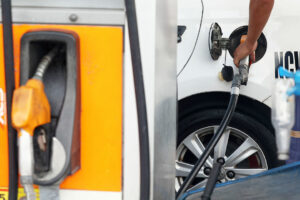Some oil firms considering hike in bioethanol blend
SEVERAL OIL FIRMS have committed to complying with the government’s mandate of higher coco biodiesel blend while considering voluntarily increasing bioethanol blend as well.

By Sheldeen Joy Talavera, Reporter
SEVERAL OIL FIRMS have committed to complying with the government’s mandate of higher coco biodiesel blend while considering voluntarily increasing bioethanol blend as well.
SEAOIL Philippines, Inc. said it is fully compliant with the B3 biodiesel mandate in all of its stations nationwide.
“We have formally expressed our intent to the Department of Energy (DoE) to participate in the implementation of the E20 ethanol blend in gasoline,” SEAOIL said in a statement sent to BusinessWorld.
Biofuel blends are numbered by the share of the non-petroleum material in the fuel, with the B3 blend indicating 3% coconut content and E20 referring to 20% ethanol content.
Republic Act. No. 9367, otherwise known as the Biofuels Act of 2006, mandates that all liquid fuels for motors and engines contain locally sourced biofuel components.
Since February 2009, oil firms had been required to implement a 2% biodiesel blend by volume in all diesel fuel sold and distributed in the country.
Starting Oct. 1, all diesel fuel sold in the country should contain a 3% coco methyl ester (CME) blend, as directed by the Energy department. The CME blend will further increase to 4% by Oct. 1, 2025 and to 5% a year after.
Oil companies can also offer gasoline fuel containing 20% bioethanol blend on a voluntary basis, increasing from the mandated 10% blend.
Cebu-based fuel retailer Top Line Business Development Corp. is also compliant with the government’s mandate of higher biodiesel blend, according to its President and Chief Executive Officer Eugene Erik C. Lim.
“As to bioethanol, we are still using the current blend,” Mr. Lim said in a Viber message. “We might (increase bioethanol blend) but just need to check the timeline for this.”
Leo P. Bellas, president of Jetti Petroleum, Inc., said that the oil firm started distributing diesel with 3% CME at its stations starting this month. The diesel sold to commercial and bulk customers is also B3.
Mr. Bellas said that the company has no plans of distributing diesel with 20% bioethanol blend in its existing stations but is considering making the gasoline grade available in its four new stations that are currently under construction.
“For the E20, it’s a decision to support the initiatives of the DoE,” Mr. Bellas said.
Pablo Luis S. Azcona, administrator of the Sugar Regulatory Administration (SRA), said that the Philippines only produces about one-third of the bioethanol demand, or 250 million liters. The rest are being imported.
“So far the increase in ethanol blend will bring an increase in molasses demand, which is good for our Filipino farmers,” Mr. Azcona said in a Viber message.
The SRA chief said that they have noticed an increase in price for molasses, a by-product of sugarcane products that can be used as a raw material in bioethanol production.
“The move to 20% (bioethanol blend) will lower the overall cost of ethanol as more imported will be added,” Mr. Azcona said.
He said that oil companies are allowed to import after they have fully consumed local supply.
For the biodiesel mandate, a major issue raised by oil firms was the “sustainability in supply of CME,” according to a report dated Oct. 14 from the United States Department of Agriculture (USDA), citing the DoE’s public information, education, and communication campaign in Manila.
“The coconut oil produced is mainly for export which commands a higher price. To comply with the mandated blend, oil companies want to be assured of CME supply given that domestic coconut production has been declining in the country,” the USDA said.
USDA has projected coconut oil production to decline by 15% to 1.6 million metric tons during the 2024 to 2025 market year due to the reduction in coconut supply.
The agency also said that oil companies are concerned over the price of CME, which climbed to P90-P95 per liter in 2024 from P57 per liter in 2021.
However, consumers are expected to benefit with the increase in mileage or the number of miles a vehicle can travel.
“The higher biodiesel blend could translate to better mileage for vehicles, as well as lower harmful emissions. As of now, oil companies have yet to reflect the cost of the increased biodiesel blend in the price of diesel since we are still in the transition phase,” Mr. Bellas said.
Meanwhile, oil firms announced on Monday a rollback in the price of gasoline by P0.50 per liter, diesel by P0.70 per liter, and kerosene by P0.85 per liter. The price reduction will take effect on Tuesday (Oct. 22).
Since January, the total adjustment of gasoline and diesel stands at a net increase of P8.55 per liter and P6.05 per liter, respectively. Kerosene has decreased by P3.60 per liter since the start of the year.
















